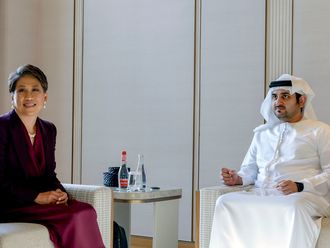Moscow:
An impending change in the leadership of Russia’s central bank will test President Vladimir Putin’s commitment to sound money.
Chairman Sergei Ignatyev will retire in June after 11 years at the helm, with a replacement to be named in March.
His successor will face the challenge of managing persistent inflation and slowing growth, husbanding half a trillion dollars in reserves and fixing regulation of Russia’s financial markets.
While sources suggest Putin will pick an orthodox policymaker — central bank insider Alexei Ulyukayev or perhaps ex-finance minister Alexei Kudrin — there are also fears he will yield to calls to use the appointment to force a change of central bank policy.
“Is the central bank going to be leant on to inject stimulus so that we get back into the bad old days of boom and bust?” asked Christopher Granville, managing director of London-based emerging markets research firm Trusted Sources.
“This will affect the nature of the Russian market: Whether it’s going to be a volatile, short-term-trading-type market, or set on the foundation for much smoother, sustainable long-term growth.”
Criticism
Ignatyev’s departure comes as the central bank faces unusually harsh criticism from leading businessmen and government officials.
Aluminium tycoon Oleg Deripaska has accused Russia’s central bankers of being “leeches” who are “sucking all the blood from the economy”. That followed a call for looser monetary policy from Deputy Prime Minister Igor Shuvalov, one of Putin’s most senior lieutenants.
The central bank hiked all its interest rates last autumn after inflation overshot its 6 percent target, and shows little eagerness to cut now, even as economic growth weakens.
The bank’s determination to bring inflation down is hardening as it completes the transition to a formal inflation-targeting regime — due by 2015 — similar to central banking practice in developed economies.
But while Putin has also voiced concerns over the slowing economy, the betting is that he will pick a successor who will continue Ignatyev’s tough-minded approach. Whatever the current policy tensions, Ignatyev’s long-term record is hard to ignore.
“Probably of all the state institutions, the central bank has the highest trust of the people, which is obviously a big change,” said Clemens Grafe, chief Russia economist at Goldman Sachs.
Ignatyev’s success in preserving financial stability and bringing down inflation contrasts with the 1990s, which saw savings wiped out by hyperinflation, and the rouble’s cataclysmic devaluation in 1998.
The rouble’s value today — just over 30 to the dollar — has barely changed since 2002 when Ignatiev took the job. Although still high at nearly 7 per cent, inflation has more than halved.
While some of Putin’s officials may be passing the buck for the slowdown to the central bank, the president has political reasons to prioritise low inflation.
Opinion polls show rising prices top public concerns, particularly among the elderly who are Putin’s core voters.
Moreover, the health of the Russian economy in five years’ time — when Putin is expected to seek re-election — is more likely to be helped by low inflation than short-term stimulus.
“Stimulus doesn’t look like it will work,” said Jacob Nell, chief Russia economist at Morgan Stanley. “It’s likely to turn into higher inflation so would be self-defeating.”
Dream candidate Putin is said to be considering giving the central bank job to Kudrin, a long-standing fiscal conservative who is seen by most investors as the dream candidate.
But it is not at all clear that Kudrin, who is reinventing himself as a pioneer of political reforms, would accept the job even if offered it.
“He’s hardly likely to agree to this work, because his interests now go beyond it,” said Alexei Makarkin, an analyst at Moscow’s Centre for Political Technologies.
Kudrin has already rebuffed suggestions that he could head a proposed financial markets ‘mega-regulator’ that would be housed at the central bank, in a move to consolidate oversight similar to that taken by Britain.
It is more likely instead that Putin will promote one of Ignatyev’s deputies. Ulyukayev, the central bank’s first deputy chairman responsible for monetary policy, is the natural choice.
A bookish ex-professor and published poet, Ulyukayev has emerged as the central bank’s most effective public communicator, vigorously defending the tight monetary policies that have provoked the ire of businesses and banks.
He has also chipped in to the global debate on currency volatility that may shape Russia’s annual presidency of the Group of 20 economies this year.
He is closely associated with the camp of liberal reformers led by the late Yegor Gaidar, prime minister in the early stages of Russia’s post-Communist transition, bolstering his credentials as a custodian of sound money.
But analysts worry that Putin may instead give the job to a senior commercial banker. Leading banks have been among the loudest advocates of looser money.
Candidates linked to the job include Mikhail Zadornov, another ex-finance minister who heads the retail arm of state bank VTB. He has told Reuters that he sees his future at VTB.
“I would be concerned about someone coming from the banking sector, or from those people from the current administration who say that much more financing is needed to promote economic growth,” said Sberbank CIB chief economist Evgeny Gavrilenkov.
“What Russia needs in the current situation is relatively tight monetary policy, and independence of the central bank is key.”












